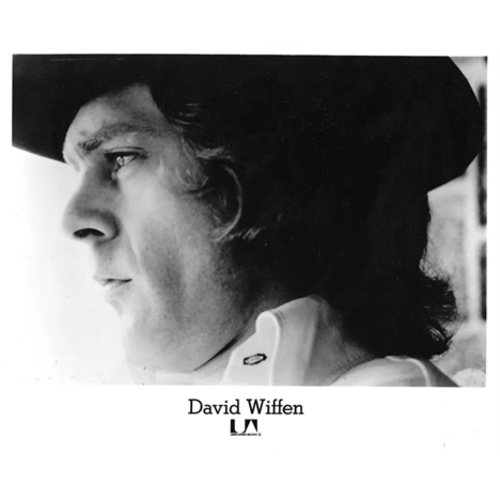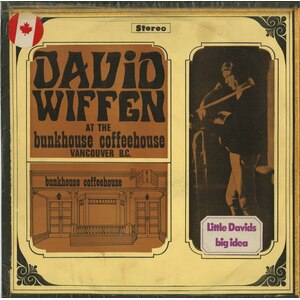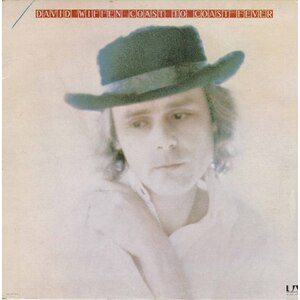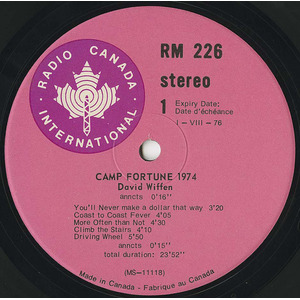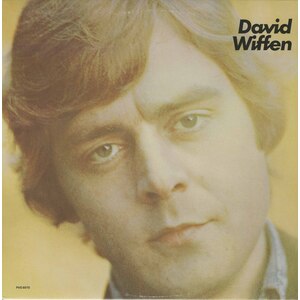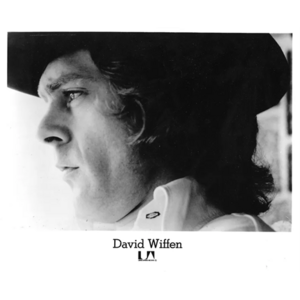Wiffen, David
Websites:
No
Origin:
England, UK - Toronto, Ontario - Ottawa, Ontario - Vancouver, British Columbia
Biography:
David Wiffen
By Nick Warburton
His songs have been covered by the likes of The Cowboy Junkies, The Black Crows, The Jayhawks, Roger McGuinn, Harry Belafonte, Tom Rush, Ian & Sylvia Tyson, Jerry Jeff Walker, and The Mother Hips to name a few.
Yet despite such a wide-appreciation and respect for his song-writing, English-born Canadian singer and guitarist David Wiffen is not the household name that he deserves to be.
Over the past few years, a series of CD/LP reissues and collections of previously unreleased material have added to the mystique surrounding this elusive musician who rarely gives interviews, with a further release in the pipeline.
In 2014, US collector’s label Water whetted fans’ appetite by releasing an expanded version of David Wiffen’s eponymous solo LP on CD, complete with four previously unreleased tracks.
A year later, Bernie Finkelstein’s True North label in Canada released Songs from the Lost and Found, 17-track compilation of never-before-heard recordings dating back to the mid-1970s.
In 2021, fans were treated to Marapeche Records vinyl release followed by Mousehole Music NLC’s CD of his hopelessly obscure debut LP, Live at the Bunkhouse. It was recorded in 1965 and today fetches astronomical sums of money for an original copy.
There are also plans for extensive 3’s a Crowd CD compilation, a popular Canadian folk-rock band from the 1960s that featured David as a member.
With this exciting CD release on the horizon, now is an opportune time to reassess his career and highlight the excellent recordings by this tragically overlooked singer/songwriter.
David Wiffen was born on 11 March 1942 in Redhill, Surrey; a historic market town about 20 miles south of London. The Second World War was at its height, and with his engineer father away contributing to the war effort David’s mother had been evacuated from the family home in East Dulwich, south London to escape the German bombing raids pounding the capital.
Mother and son soon moved to nearby Chipstead where David grew up on his auntie’s farm. Then, after the war, the family returned to London and Sydenham, a leafy suburb near Crystal Palace where David’s brother Graham was born in 1950.
David and Graham had a distinctly English middle class upbringing, which came with all of the expectations of such a background; both siblings were expected to excel academically and follow a profession. By all accounts, David’s parents were not wholly supportive of his musical aspirations and his intention to pursue a career as a musician, after starting piano lessons, was viewed with some disdain.
In 1956, his father relocated from the company’s head office at Victoria in central London to Esher, a wealthy commuter town in Surrey, not far from Hampton Court Palace. The family moved to nearby Claygate and while attending school in Hinchley Wood, David began to explore the local music scene, which less than a decade later would give birth to notable bands like The Yardbirds.
Like thousands of young English kids, David was caught up in the skiffle craze spearheaded by Lonnie Donegan, and soon after moving to the area, the young teenager joined his first band, The Black Cat Skiffle Group, based in Kingston upon Thames.
While the young singer was enjoying his first taste of the nascent music scene flourishing in southwest London, his father was sent to Toronto on a six-month assignment. When the contract was extended to a year, the rest of the family was brought over from England. David was 16 years old, and the move was not an easy one to make.
“For David it must have been a big change because he’d just started to get into music,” says his younger brother. “He had a skiffle group… and suddenly to be taken away from what was going on… must have been very hard and I think it took him a while to adjust.”
Settling into a new country took time and David returned to England briefly to stay with one of the extended family on a farm in Wiltshire.
In retrospect, it’s tempting to ponder what might have been had David Wiffen remained in Surrey to pursue a folk career rather than head back across the Atlantic and make Canada his home. Rather than rub shoulders with the likes of Gordon Lightfoot, Ian & Sylvia Tyson, Bruce Cockburn and Joni Mitchell, he might well have ended up instead hanging out with fellow southwest London folkies, John Martyn and Sandy Denny and American expatriate Paul Simon.
Then again, had he not returned to Toronto, David’s appreciation of singers like Big Bill Broonzy and Fred Neil, who would come to influence his own singing, may not have been so pronounced. Back in Canada, the young singer took up the guitar and began to hang out on the local folk scene, performing regularly at a coffee house called the Village Corner, where he befriended future Mamas and Papas singer Denny Doherty, Ian & Sylvia Tyson and Gordon Lightfoot among others.
Looking back, Graham Wiffen feels that these early years back in Toronto were not an easy time for his brother, who was yet to lose his English accent. “I think it was probably very hard for him as an English person, trying to fit into that environment, both socially and musically. But somehow he must have got himself established with these people because he stuck with it.”
Interestingly, had David moved to Toronto a few years later (after The Beatles and Rolling Stones had spearheaded the British Invasion), it may have been an entirely different story. Needless to say though, his incredible baritone voice and undoubted talent were starting to win over audiences.
David remained restless, however, and eager to see Western Canada, he hitchhiked out to Edmonton in early 1964 before basing himself in Calgary where he managed the Depression folk club for nine months. It was there that he met future 3’s a Crowd collaborators singer Donna Warner and guitarist/singer Brent Titcomb, who urged him to check out the thriving folk scene in Vancouver.
Invited to perform at the city’s Bunkhouse coffeehouse (at 612 Davie Street) with an ensemble of other musicians for a proposed folk sampler, David duly made the trek west in January 1965.
On arrival, however, he found that none of the other musicians had showed up due to huge snowstorm, so the resulting recording became his debut LP – the ultra-rare Live at the Bunkhouse, a 100 copies of which were pressed and released by the New York-based International Records label. (Ed. The album was in fact recorded in a three-hour session at a small studio on West Broadway.)
Arguably the rarest of David’s recorded output, the album fetches thousands of dollars whenever it appears on eBay and offers a tantalising glimpse of his early ventures on the folk scene. Besides covers of Ian Tyson’s “Four Strong Winds” and Jesse Colin Young’s “Four in the Morning”, the album also showcases David’s first stab at writing original material – the superb “Slice of Life”.
Another notable recording is his sensitive reading of B B Johnson’s “Since I Fell for You”, a song made popular in the mid-1950s by Lenny Welch, which David would re-record for his eponymous solo studio album in 1971.
With the recording under his belt, David’s next move was to join The Pacers, a beat group from Prince George, British Columbia that had travelled to Vancouver to star in the annual Battle of The Bands competition. Whether this was the same Pacers that had once featured Canadian guitarist Ken Lundgren, a one-time member of English band, The Outlaws with Ritchie Blackmore, is unclear but when David signed up the other members were Kenny Danrott, Pat Griffith, Brian Hilton and Carl Sande.
Against stiff opposition, The Pacers won the competition and the prize, which was a recording contract with RCA Victor to cut a ‘45. After cutting two tracks – “I Want You Back” c/w “Windjammer”, subsequently released on a single in late 1965, The Pacers were offered further work in Montreal, Quebec and duly headed east in anticipation of a lucrative engagement at one of the city’s top clubs and an opportunity to record more material.
On arrival, however, the band learnt that the offer of a recording deal was non-existent while the live work involved performing gruelling hours from 8pm to 3am seven nights a week for very little money. With the exception of David Wiffen, all of the band members soon lost heart and returned to Vancouver.
David meanwhile decided to move to Ottawa after hearing about the vibrant folk scene based around the city’s top folk club, the Le Hibou coffee house. During this period, he also returned home to Toronto to visit his family and in August 1966 made his solo debut at the city’s famous Mariposa Folk Festival.
Carving out a niche for himself as solo artist, it didn’t take long for David to start turning heads and by late 1966, he was offered a vocal spot in Ottawa’s top folk/rock group, The Children, which at the time included the late singer and poet Bill Hawkins, guitarists/singers Sandy Crawley and Bruce Cockburn, bass player Neville Wells and former Esquires drummer, the late Richard Patterson, who would become one of David’s longstanding friends and collaborators.
While The Children only lasted about six months, after Wiffen and Patterson’s arrival that autumn, it proved an invaluable experience for David. Besides opening for The Lovin’ Spoonful in Toronto and Ottawa during the latter’s Canadian tour, The Children also got the opportunity to record a series of demos to showcase the superb song-writing talents within the band – most notably the prolific Bill Hawkins and Bruce Cockburn.
In 2013, Bernie Finkelstein’s True North joined forces with Mousehole Music NLC in Smith Falls, Ontario to release Time Capsule: The Unreleased 1960’s Masters, which gathered together 25 tracks. One of David’s best songs, “I Don’t Want To Drive You Away”, was included in the collection and became a regular number for his next band project, 3’s a Crowd, which he joined in April 1967 with Richard Patterson.
Formed in 1965, the original 3’s a Crowd had featured singer Donna Warner and guitarist/singers Brent Titcomb and Trevor Veitch. After recording two singles for Epic Records, the trio had added former Neil Young collaborator Ken Koblun on bass, who had recently left the band when Wiffen and Patterson joined that spring. The new bass player was another Neil Young school friend, the late Comrie Smith.
Over the next six months 3’s a Crowd ventured south to the US several times, appearing at Steve Paul’s prestigious New York nightclub, The Scene as well as making regular visits to the Back Porch Club in Columbus, Ohio. After appearing at the Mariposa Folk Festival in August 1967, Ken Koblun returned to 3’s a Crowd just in time for its performance at Expo ‘67 International World Fair in Montreal where the band dropped into the studio to visit Leonard Cohen while he was recording his debut album.
For 3’s a Crowd, Expo proved to be the pivotal event of the year and led directly to the band securing an important recording deal with US label, Dunhill Records. Among those attending 3’s a Crowd’s performance were Cass Elliot and David’s old friend from the Village Corner, Denny Doherty, whose band The Mamas & The Papas were one of Dunhill’s top earners.
After cutting a demo at New York’s Bell Studios with producer Rick Shorter, the band flew down to Los Angeles that October to begin recording an album entitled Christopher’s Movie Matinee at Studio 3, Western Recorders on Sunset Boulevard assisted by engineer Chuck Britz.
Besides excellent covers of folk-rock stables such as Dino Valenti’s “Let’s Get Together, the album is notable for showcasing many of The Children songs, including Bill Hawkins’ “Gnostic Serenade” and “Cotton Candy Man”, Bruce Cockburn’s “Bird Without Wings” and David Wiffen’s excellent folk-rocker “I Don’t Want To Drive You Away”.
Besides penning one of the strongest cuts on the album, David’s attractive baritone graced two of the best songs – the melancholic “Gnostic Serenade” and “Cotton Candy Man”.
With the album recorded, 3’s a Crowd returned to Toronto and continued to gig incessantly but the heavy workload eventually took its toll as first Ken Koblun and then Donna Warner bowed out, making way for Wayne Davis from Bobby Kris & The Imperials and noted singer Colleen Peterson.
Tragically, just as 3’s a Crowd’s album, Christopher’s Movie Matinee was climbing the Canadian charts Brent Titcomb and Trevor Veitch lost heart and left in May 1968.
With commitments still to honour, 3’s a Crowd were rebuilt from scratch with David Wiffen, Colleen Peterson and Richard Patterson joined by former Children members Bruce Cockburn and Sandy Crawley plus bass player Dennis Pendrith, who’d been working with Cockburn in his band Olivus.
The new-look 3’s a Crowd recorded Cockburn’s experimental “Electrocution of The Word” and began work on a TV series One More Time before Crawley departed to focus on his acting career.
During this period, David introduced one of his best known compositions, “More Often Than Not”, in to the band’s set. However, after a spring 1969 tour of US colleges and universities, 3’s a Crowd unravelled, leaving David to pick up the solo career he’d put on hold back in the summer of 1966.
Bill Horon, reporting for the Montreal Star, caught one of David’s gigs at the city’s Yellow Door club in August of that year where his set list included covers of Fred Neil’s “The Other Side of This Life” and The Rolling Stones’ “No Expectations”, as well as his own “It Doesn’t Seem To Matter Anymore”.
“His music revolves around new city and country blues. It spins in a woven lane of thoughts and expressions that reflect the moods of the blues,” wrote Horon.
“In his own way, he is very much a part of the current music trend. Blues, country flavoured and old time rock songs are here enjoying a healthy period of popularity. Wiffen’s material can only have a positive effect on his listeners.”
That same year, David landed a spot on CJOH-TV’s Both Sides Now, co-hosting the prestigious music show with South African-born singer Ann Mortifee. His regular live work and growing profile soon landed him a deal with American record label Fantasy Records and in 1970 David paid his way down to Oakland, California to record his eponymous solo studio album.
The label – best known for making a mint out of Creedence Clearwater Revival albums – arranged for him to work with former Youngbloods guitarist Jerry Corbitt, and although David was able to invite along Sandy Crawley, most of the players were unfamiliar to him.
The studio sessions, which dragged on for 10-weeks, were challenging and the entire experience was somewhat disappointing, as David later revealed in an interview with David Farrell for Music Canada Quarterly in spring 1974.
“I was totally wiped out by the end of it,” he confessed. “I was living and working with complete strangers and becoming emotionally fatigued. One day I got out of bed and found 10 people loafing around the house I was staying in, none of whom I knew. I just went back into my room and slammed the door shut. It was then that I wrote ‘Mr Wiffen Is Incommunicado Today’ (aka ‘Mr Wiffen).”
While David subsequently expressed dissatisfaction with the final recording (the album was finished without his involvement and the master tapes were reportedly damaged), David Wiffen is a superb collection that contains his most widely covered songs, most notably, the superb blues-rocker “Driving Wheel” and the autobiographical “Mr Wiffen” and “More Often Than Not”, the latter a frank admission of his growing drink problem.
Also noteworthy is David’s brilliant “Never Make a Dollar That Way” (the lyrics of which refer to former Children singer Bill Hawkins, who was travelling back from Mexico and ran into David on his way to California) and his sublime re-working of B B Johnson’s “Since I Fell For You”, which he’d first recorded on the 1965 Bunkhouse album in Vancouver.
Unfortunately, only review copies of David’s album were made available in the US, and while the record did see a Canadian release, copies are now extremely scarce. Despite the album’s rarity, American rock magazine Cashbox chose it as “Newcomer Pick of the Week”, while in Canada, the single “More Often Than Not” became a minor hit, reaching #85 on the RPM chart in May 1971.
Back home, David’s stock rose thanks to his exposure on CTV shows Rolling on the River and the Ian Tyson Show. Also, it didn’t hurt that artists like Tom Rush, Ian & Sylvia Tyson, Jerry Jeff Walker, Anne Murray, Eric Anderson and Harry Belafonte had recorded songs from his first studio album, further enhancing his street cred among singer/songwriters.
Thanks to a deal arranged by Tom Rush’s manager Bennett Glotzer, David signed to United Artists in late 1972 and returned to the studio to record what would become his most accomplished album, with veteran producer Brian Ahern overseeing the sessions. After cutting one track, a heartfelt reading of Willie P Bennett’s “White Lines”, David’s old friend Bruce Cockburn was brought in to rescue the album.
Pulling together a superb studio group featuring pianist Pat Godfrey, drummer John Savage and sax player Bruce Pennycook, all formerly members of Toronto rock outfit, Simon Caine; percussionist Bill Usher; and bass player Dennis Pendrith, who’d appeared on Cockburn’s first four solo albums, Bruce did a masterful job in the producer’s chair, turning David’s second studio album Coast To Coast Fever into masterpiece. Cockburn also added some sensitive, understated guitar work that really brings David’s attractive baritone to the fore.
Highlights are hard to pick but “Smoke Rings”, “Lucifers Blues”, “Full Circle” and “Coast To Coast Fever” are just a few of the superb songs on offer. Perhaps not surprisingly, the album was nominated for a Juno award in the folk album category in 1974 but lost out to Gordon Lightfoot’s Old Dan’s Records.
Reviewing David’s album for Music Canada Quarterly, David Farrell reflected on the inspiration for many of the compositions: “The combination of hard times and depression has been the basis of numerous songs, making it a rather tiresome subject to harp on. And yet, Wiffen manages to convey his own particular situation a shade better than most. Possibly because it was a real situation and written at the time; the simplicity and honesty leaves little room for pretentiousness.”
With the album picking up positive reviews, David hit the road with his support band, The Children (not to be confused with his mid-1960s band), featuring his longstanding friend/road manager Richard Patterson on drums.
However, it would be nearly 25 years before he returned to the studio to record his long-awaited third studio album, 1999’s South of Somewhere, which found the singer/songwriter introducing a number of superb recent compositions such as “(No Desire) For Texas”, “Fire on the Water” and the title track, alongside reworked versions of his “classics”.
David had continued to perform on the folk circuit, with largely positive reviews, throughout the rest of the 1970s but eventually gave up performing. He then worked as a limousine driver and a driver for the handicapped but injured his back. David eventually had back surgery but couldn’t handle the physical demands of driving the handicapped. Convalescing, he started to channel his creative energies into writing poetry and painting; several of his poems and artworks were later published and exhibited.
Then, in the early 1990s there was a renewed interest in his work when a new generation of musicians began name checking the singer/songwriter, most notably The Cowboy Junkies, who recorded an impressive version of “Driving Wheel” in 1992, prompting David to return, somewhat reluctantly to performing, including a Children reunion in 1997. Two years earlier, he’d also been inducted into the National Capital Music Association Hall of Fame.
Since then cover versions by notable artists as diverse as The Jayhawks, Blackie & The Rodie Kings, The Black Crows, and Rumer have helped to raise his stock among music audiences.
Songs from the Lost and Found was a welcome release in 2015, offering fans the opportunity to hear previously unreleased studio recordings like “Sweet Angel Take Me Home”, “Come Down to the River” and “Rocking Chair World”.
Likewise CD re-issues of David Wiffen and Live at the Bunkhouse are also positive moves. A similar release of his Coast To Coast Fever masterpiece is long overdue and in May this year, Canadian comedian and television personality Rick Mercer hosted a radio show that sang the album’s praises.
However, what fans would really love is a comprehensive multi-CD box set of his entire work, including any other previously unreleased gems left in the vaults. Such a release would certainly help David gain the acclaim and widespread recognition that he deserves.
Many thanks to the following for helping to piece this story together: David and Joanne Wiffen, Graham Wiffen, Ian McLeish and the late Richard Patterson.
This is a significantly updated version of an article that first appeared on the Nick Warburton website in 2009.
To contact Nick Warburton, email: Warchive@aol.com
Copyright © Nick Warburton. All Rights Reserved. No part of this article may be reproduced or transmitted in any form or by any means, without prior permission from the author.
